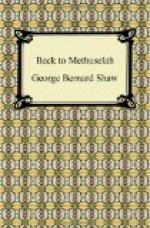THE ARCHBISHOP. Yes, Mr Chief Secretary: the truth. Like all revolutionary truths, it began as a joke. As I shewed no signs of ageing after forty-five, my wife used to make fun of me by saying that I was certainly going to live three hundred years. She was sixty-eight when she died; and the last thing she said to me, as I sat by her bedside holding her hand, was ‘Bill: you really don’t look fifty. I wonder—’ She broke off, and fell asleep wondering, and never awoke. Then I began to wonder too. That is the explanation of the three hundred years, Mr Secretary.
CONFUCIUS. It is very ingenious, Mr Archbishop. And very well told.
BURGE-LUBIN. Of course you understand that I don’t for a moment suggest the very faintest doubt of your absolute veracity, Archbishop. You know that, don’t you?
THE ARCHBISHOP. Quite, Mr President. Only you don’t believe me: that is all. I do not expect you to. In your place I should not believe. You had better have a look at the films. [Pointing to the Accountant General] He believes.
BURGE-LUBIN. But the drowning? What about the drowning? A man might get drowned once, or even twice if he was exceptionally careless. But he couldn’t be drowned four times. He would run away from water like a mad dog.
THE ARCHBISHOP. Perhaps Mr Chief Secretary can guess the explanation of that.
CONFUCIUS. To keep your secret, you had to die.
BURGE-LUBIN. But dash it all, man, he isn’t dead.
CONFUCIUS. It is socially impossible not to do
what everybody else does.
One must die at the usual time.
BARNABAS. Of course. A simple point of honour.
CONFUCIUS. Not at all. A simple necessity.
BURGE-LUBIN. Well, I’m hanged if I see it. I should jolly well live for ever if I could.
THE ARCHBISHOP. It is not so easy as you think. You, Mr Chief Secretary, have grasped the difficulties of the position. Let me remind you, Mr President, that I was over eighty before the 1969 Act for the Redistribution of Income entitled me to a handsome retiring pension. Owing to my youthful appearance I was prosecuted for attempting to obtain public money on false pretences when I claimed it. I could prove nothing; for the register of my birth had been blown to pieces by a bomb dropped on a village church years before in the first of the big modern wars. I was ordered back to work as a man of forty, and had to work for fifteen years more, the retiring age being then fifty-five.
BURGE-LUBIN. As late as fifty-five! How did people stand it?
THE ARCHBISHOP. They made difficulties about letting me go even then, I still looked so young. For some years I was in continual trouble. The industrial police rounded me up again and again, refusing to believe that I was over age. They began to call me The Wandering Jew. You see how impossible my position was. I foresaw that in twenty years more my official record would prove me to be seventy-five; my appearance would make it impossible to believe that I was more than forty-five; and my real age would be one hundred and seventeen. What was I to do? Bleach my hair? Hobble about on two sticks? Mimic the voice of a centenarian? Better have killed myself.




